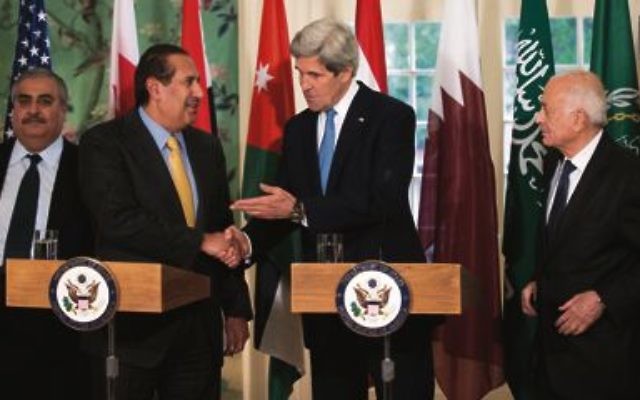A major shift but a long way to go
Last week the United States pinned its hopes for an advance in the Israeli-Palestinian peace process on the Arab Peace Initiative (API). What exactly is this plan, what are its terms, and what is the significance of the new concession by its backers?
The Arab League, the regional alliance of Arab states, proposed the API in the thick of the Second Intifada, in 2002. What made the Saudi-led initiative unique was the fact that instead of concerning itself just with a bilateral peace between Israel and the Palestinians, it offered a broader peace with the Arab powers.
Hamas hasn’t supported the API, and said last week that the plan would “harm the Palestinian cause”. But interestingly, it resisted the temptation to vote against it at an Arab League summit in 2007 and instead abstained, leading some analysts to believe that it could potentially be brought around to it.
In the plan, the Arab states were prepared to “consider the Arab-Israeli conflict ended, and enter into a peace agreement with Israel, and provide security for all the states of the region”. They would also “establish normal relations with Israel in the context of this comprehensive peace”.
Their price was high, and last week’s development was the first real discussion about this since the API was issued.
The Arab states demanded in 2002 that Israel withdraws to its lines as they stood on the eve of the Six-Day War in 1967. It was presented as a take-it-or-leave-it proposal. Then last week, the Arab League announced that it had come round to the idea of some flexibility on borders – it would agree to some land swaps.
Land swapping, in the context of the Israeli-Palestinian conflict, means Israel yielding land within its sovereign borders to the Palestinians in return for agreement by the Palestinians that it can hold on to some land which they deem “occupied”. The idea is that it will allow Israel to hold on to some areas of East Jerusalem and some settlements in a future peace deal and minimise the need to evacuate Israelis, in exchange for some parcels of land adjacent to the West Bank.
The idea isn’t a new one, and has significant support in Israel’s ruling Likud-Beitenu party and in the Palestinian Authority (PA). The “Palestine Papers”, a set of PA memos leaked in 2011, showed that its officials were prepared to agree to significant land swaps. But until now, the idea was taboo for the Arab League, which single-mindedly insisted that only 1967 borders would be acceptable – even though it understood that Israel would never agree to these. The new Arab League announcement means that the API could have a future.
But it is a long, long, way from the kind of proposal that Israel’s leaders and citizens would like to see.
Aside from the small areas that could be kept by Israel in return for land swaps, the API still demands major withdrawals. It doesn’t just see Israel leaving the West Bank and surrendering all authority over Gaza – which the Israeli public is relatively open to. It also demands a pullout from parts of Jerusalem captured in 1967 – which it isn’t.
Most likely, the division of Jerusalem is a bullet that Israelis will have to bite for a two-state solution in any of its permutations. But there’s another demand in the API that is particularly troubling for Israelis right now. It requires withdrawal from the Golan Heights. This isn’t even part of the Israeli public discussion, and with a civil war raging just below the Heights, in Syria, and fears about the existence and use of chemical weapons there, it is difficult to imagine that citizens would even consider such a pullout at the moment.
Beyond the gulf on the issue of borders lies a gulf on the matter of refugees. The Arab League is insistent that Palestinian refugees – by which it means those who left what became Israel and their descendants – should be able to return there. Israeli leaders and most citizens are dead against a right of return for Palestinians, taking the view that it would destabilise the Jewish majority in Israel.
One’s assessment of the significance of last week’s announcement depends on whether the glass is half full or half empty. It can be seen as the first concession after a decade of the API’s existence, which could pave the way for further concessions on borders and refugees. Or one can remark that the fact that after a whole decade all the Arab League can manage is a miniscule concession bodes badly for the prospects of peace.
NATHAN JEFFAY


comments